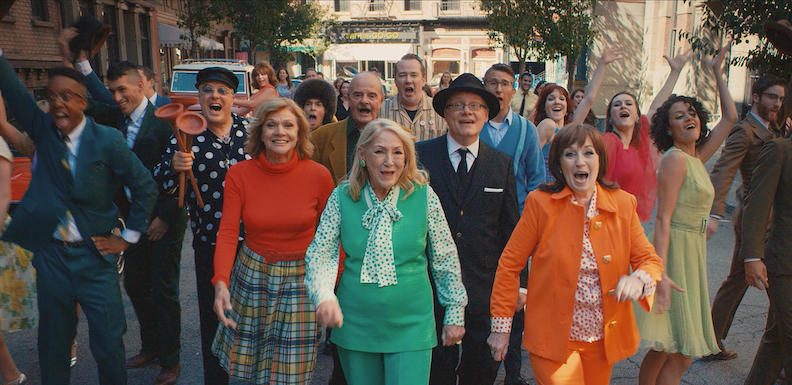
One of the most fascinating things about the modern world is the phenomenon of “cultural detritus.” Cultural detritus is all the stuff in the mass-media world that’s limited-use, meant for a specific purpose and never meant to be archived, kept, studied or even remembered.
buy Zyban generic buy Zyban online generic
You know, the kind of stuff Negativland makes records out of. The shorts that show up on Mystery Science Theater 3000 and Rifftrax. But where the Centron shorts from MST3K might look cheap, the world explored in Bathtubs Over Broadway is anything but.
Bathtubs Over Broadway, starring Late Show With David Letterman writer Steve Young, is all about the forgotten world of the industrial musical. Industrial musicals were, well, just that — musicals put on by a company meant to inform their sales force about this year’s model of veeblefetzer. Often only performed at annual sales meetings, most industrial musicals were seen once or twice, and then forgotten. Some musicals were lucky, captured on vinyl albums pressed as souvenirs for attendees.
Most of these records ended up in landfills. A few made their way to thrift shops and the “Miscellaneous” section of used record stores. That’s how Steve Young first discovered them. The early years of Late Night With David Letterman had a recurring segment called “Dave’s Record Collection.” The bit survived the network jump, and it was on Late Show that Young took over curating the bizarre and hilarious albums used in the bit.
Young wasn’t a record collector, and didn’t have much interest in any of the other stuff in “Dave’s Record Collection.” (For example, one of the records in the clip embedded above is a volume of Raymond Scott‘s Soothing Sounds for Baby — a highly regarded album of early electronic music, and a pretty rare one to boot. One mint condition volume of the original pressing is currently listed at Discogs for $7,000.) But, for whatever reason, something about the industrial musical albums appealed to Young. The call of perky people peddling products set to an orchestra spoke to him in a strange way, and he started collecting them.
One of the things that likely brought Young in — the high production values on something seemingly so useless. And the production values were very high. Hank Beebe, the writer of a number of industrial musicals, points out that at the time, a hit like My Fair Lady had a budget of $450,000 in 1960s dollars. On the other hand, companies would spend $3 million on an industrial musical.
With a budget like that, companies could afford top-tier talent. In addition to the industrials, Hank Beebe wrote the score for Hellzapoppin’, starring Jerry Lewis and Lynn Redgrave. Jerry Bock and Sheldon Harnick, who wrote music and lyrics for Fiddler on the Roof, were behind the 1959 Ford Tractor show Ford-i-fy Your Future. Kander and Ebb, the minds behind Cabaret and Chicago, did Go Fly a Kite for General Electric in 1966.
There were a number of famous names who also worked in industrial musicals — some of whom were interviewed for Bathtubs Over Broadway, including Florence Henderson, Tony Randall, Chita Rivera and Martin Short.
While Steve Young’s initial interest is “Wow, this is weird,” he soon gets drawn into finding out as much as he can. Over the course of finding new records for his collection, he starts befriending the people behind the musicals — both writers and actors. And, too, it’s clear from Young’s memorization of so many lyrics that his enjoyment is not ironic. There are a few scenes where composers like Beebe and Sid Siegel play their songs while Young sings. It’s hard to tell what they think of this, considering that the composers likely hadn’t thought of these songs since they were first written and performed.
Though Bathtubs Over Broadway is about industrial musicals, it’s also about the end of the Late Show. And, ultimately, the end of an era. In the 1980s and 1990s, industrial musicals became less popular with companies, and most of the actors and writers who depended on them found themselves out of work — much like Young.
But the film isn’t sad. The most it gets is wistful, but overall it’s a happy film. Artists are being rediscovered and fawned over for work they thought the world had forgotten. It’s ultimately a celebration as much as it is a look at a secret world most people — no matter how big a musical fan — had never known about.
Watch the Bathtubs Over Broadway trailer below:
Bathtubs Over Broadway is now streaming on Netflix.
Kittysneezes is supported by readers like you. If you enjoy what you’ve read here, please consider supporting us on Patreon, on Ko-Fi or via the Kittysneezes Boutique. And remember to check out our brand new podcast, Rite Gud!